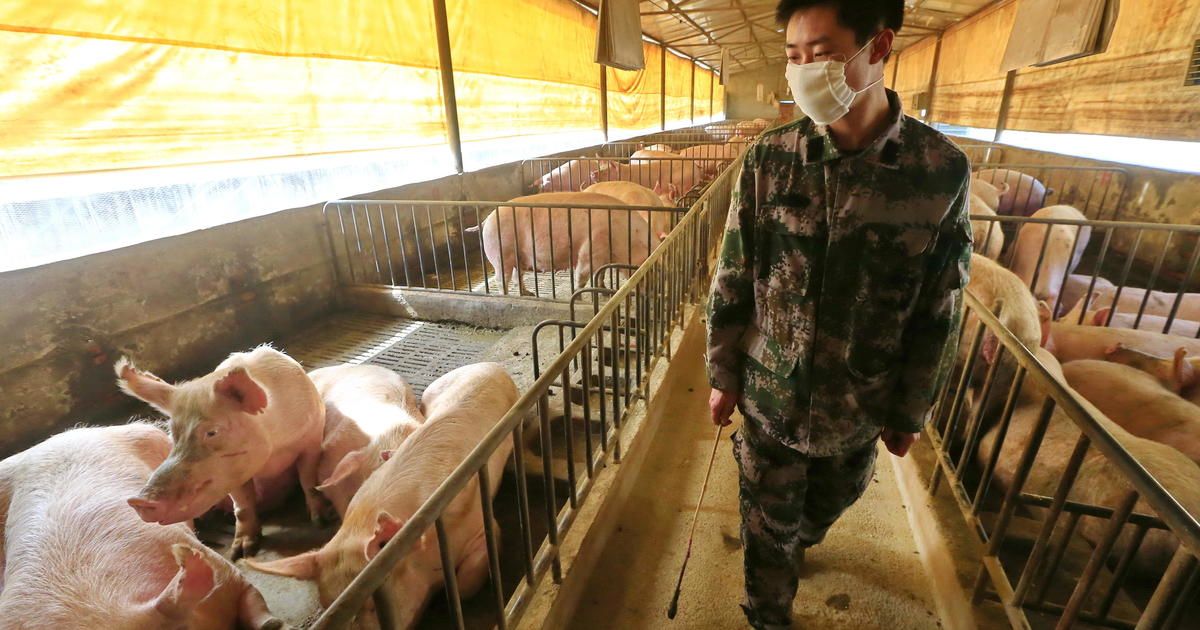New swine flu virus could potentially trigger a pandemic, Chinese study finds

A few minutes every morning is all you need.
Stay up to date on the world's Headlines and Human Stories. It's fun, it's factual, it's fluff-free.
Scientists in China published a study on Monday about a new strain of the H1N1 swine flu virus that has been spreading among pig farmers in the country. They warn that it could potentially be capable of triggering a pandemic and should be “urgently” monitored.
The virus, which researchers call G4, is genetically derived from the highly transmissible H1N1 virus strain which caused a pandemic in 2009, killing about 285,000 globally.
In the study published in the American scientific journal Proceedings of the National Academy of Sciences (PNAS), researchers from Chinese universities and the Chinese Centre for Disease Control and Prevention said that the G4 virus displays “all the essential hallmarks of a candidate pandemic virus.”
The specific G4 strain in question, G4 EA H1N1, has been found frequently in workers from China’s pig farms since 2016. It is known to replicate effectively in human airways and has so far infected some people without causing disease, although health experts warn that this may change unexpectedly.
As part of a project to identify potential pandemic strains, researchers from the China Agricultural University closely surveilled pigs from farms and veterinary training centers across 10 different provinces and have collected around 30,000 nasal swabs. Their samples allowed them to isolate 179 different swine flu viruses.
In the last three years of the study, researchers collected 338 blood samples from workers on pig farms and 230 samples from people in nearby households.
They found that 10.4% of workers and 4.4% of nearby residents tested positive for antibodies created by exposure to the G4 virus. The antibodies were also found to be more common in workers from the ages of 18-35, showing up in 20.5% of participants.
Various experiments were then conducted on ferrets – which are frequently used in flu studies as they typically exhibit similar flu symptoms to humans, namely fever, coughing and sneezing.
This specific G4 strain was observed to be highly infectious and adept at replicating in human cells. It also infected and transmitted between ferrets, causing more serious symptoms in them in comparison to other viruses.
The researchers also found that any immunity humans had from prior exposure to seasonal flu did not affect their likelihood of contracting the G4 virus.
Although the virus can be passed from animals to humans, there is no evidence yet of human to human transmission.
However, researchers remain cautious and recommend that “close monitoring in human populations, especially the workers in [the] swine industry, should be urgently implemented.”
“It is of concern that human infection of [the] G4 virus will further human adaptation and increase the risk of a human pandemic,” they wrote in the paper.
Martha Nelson, an evolutionary biologist at the US National Institutes of Health’s Fogarty International Center, said that the “likelihood that this particular variant is going to cause a pandemic is low.”
Despite this, she notes that the discovery of the pandemic H1N1 strain only came after the first human cases surfaced. “Influenza can surprise us,” she said. “And there’s a risk that we neglect influenza and other threats at this time” given the ongoing COVID-19 pandemic.
Christian Lindmeier, the spokesman for the World Health Organization (WHO), said in a Tuesday briefing in Geneva that the organization will read the Chinese study carefully, stressing the importance of collaboration between the international research community and monitoring animal populations.
“[The study] also highlights we cannot let our guard down on influenza and need to be vigilant and continue surveillance even in the coronavirus pandemic,” Lindmeier added.
Chinese Foreign Ministry spokesperson Zhao Lijian also addressed these findings in his regular press conference on Tuesday, saying that more work would be needed in order to verify the study.
“Experts believe the conclusion of that article is not representative as the number of the test samples is not large enough,” said Zhao, before adding that “the competent authorities and experts will enhance monitoring, issue warnings in a timely manner and properly handle the situation.”
According to Nelson, scientists would ideally produce a human G4 vaccine in preparation for a possible growth in infection rates, saying that “we need to be vigilant about other infectious disease threats even as COVID is going on.”
“Viruses have no interest in whether we’re already having another pandemic,” she added.
Have a tip or story? Get in touch with our reporters at tips@themilsource.com




Comments ()